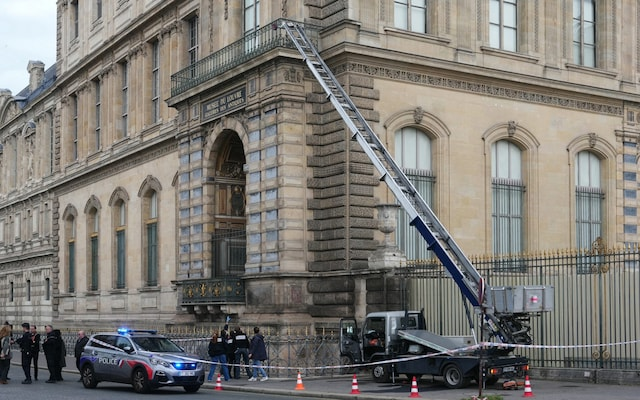A raid on France’s top museum that saw thieves flee with royal jewels has raised awkward questions about how well the country’s priceless cultural heritage is being protected. How could robbers with power tools break in and steal crowns, sapphire and emerald necklaces? The government said authorities had already begun reviewing security at the vast Paris venue before the heist. Labour unions there have complained that security staff positions have been cut.
The Louvre’s then director Pierre Rosenberg warned that the museum’s security was “fragile” after a painting by French master Camille Corot was stolen in broad daylight in 1998. Taking over in 2021, its current director Laurence des Cars asked the Paris police to conduct a security audit of the museum. Following this audit, recommendations were made “a few weeks, a few months ago”, said Culture Minister Rachida Dati after the raid. They “are beginning to be implemented”, she said, without elaborating. The culture ministry said in a statement that alarms linked to the windows of the Apollo Gallery went off when the thieves penetrated them in a “particularly fast and brutal break-in”.
Labour unions said the museum’s security had been undermined by staff reductions in recent years, even as museum attendance has soared. One union source, who asked not to be named, said the equivalent of 200 full-time posts had been cut at the museum over the past 15 years, out of a total workforce of nearly 2,000. The SUD union complained of “the destruction of security jobs” at the Louvre. “This robbery comes a few months after museum employees warned about security flaws,” said a deputy mayor of Paris, David Belliard. “Why were they ignored by the museum management and the ministry?”
In response to warnings about the state of the Louvre, France’s President Emmanuel Macron this year announced a colossal renovation project. Dati said the renovation project featured a new “security master plan”. The culture ministry said security measures would be “improved with new-generation cameras deployed”.
The Louvre was just the latest French museum to be targeted. Just last month thieves broke into the Natural History Museum in Paris at night and stole six kilos of gold nuggets. “Museums are increasingly targeted for the valuable works they hold,” the Central Office for the Fight against Trafficking in Cultural Property (OCBC) told AFP. According to the office’s figures, museum burglaries peaked at 31 in 2015, with nine recorded in 2023 and 21 in 2024.
原创编写 版权所有 侵权必究 每日更新 个性化阅读 英语飙升
2. 2. What can be inferred about Rachida Dati’s attitude from the passage?
A She considers the security issues exaggerated.
B She seems content with the current progress.
C She admits existing flaws while highlighting ongoing efforts.
D She assigns major blame to the former administration.
3. 3. What can be inferred about the union’s stance?
A They advocate for additional staff cuts.
B They think technology can substitute staff.
C They link personnel reduction to security failures.
D They blame the theft on inefficient crowd control.
4. 4. The author cites the burglary statistics primarily to ________.
A contrast security conditions among museums
B underscore the ongoing risk of museum thefts
C demonstrate the effectiveness of security measures
D stress the growing attendance at museums
5. 5. What is the passage mainly about?
A Major art theft incidents occurring in Europe.
B The increasing public interest in French museums.
C New policies on culture introduced by the French government.
D Security deficiencies revealed by a museum robbery.







 更多优质学习内容
更多优质学习内容



